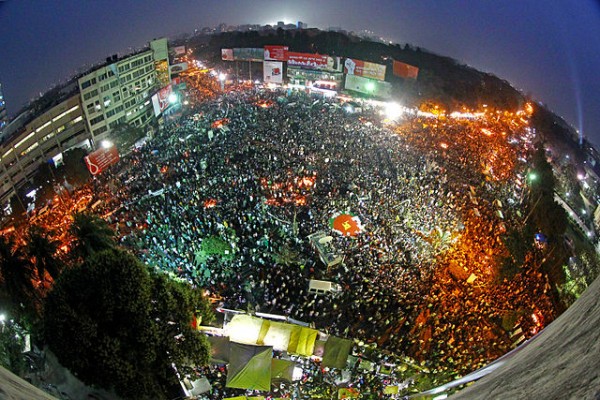
Avijit04, Wiki Commons
Oscar Wilde in his masterpiece The Picture of Dorian Gray stated that, “nothing is more essential than being young and beautiful.” Unfortunately, today, the political space of India and Bangladesh is neither young nor it can be categorized as beautiful. To better understand this argument, it is important to take into consideration the aspirations of the founding fathers of both India and Bangladesh, and the vision that shaped the inception of these countries. That is, while the general population at large in South Asia remained dogmatic, plagued with caste differentiation and superstitions, the political elites it produced had historically the heart and mind to imagine a liberal and progressive socio-political arena. It was this ideological conviction that guided the formation of slogans like ‘unity in diversity’ during the colonial era, which ultimately sowed the dream of a secular polity.
Yet, in contemporary times, the values that shaped the liberation movements of both India and Bangladesh are under threat from both Hindu and Islamic radicalism. Anti-incumbency sentiments are high and mainstream opposition parties in India and Bangladesh have opportunistically utilized such public vibe by allying with radical religious elements. What it means for India is that a primary instigator of 2002 Gujrat riot Chief Minister Nerendra Modi of Bharatiya Janata Party (BJP), who is known for his direct advocacy of Hindutva as a social makeup of India, entertains the onus of opposition leadership and has a genuine chance of becoming India’s 14th Prime Minister. In fact for recent state elections of Delhi, Madhya Pradesh, Rajasthan and Cjjattisgarh, exit polls predict that BJP will sweep critical states such as Madhya Pradesh and Rajasthan, and this will strengthen Narendra Modi’s grip over the outcomes of Lok Sabha elections in 2014. This is indeed a painful thought given India’s political process witnessed the emergence of leaders like Mahatma Gandhi, Jawaharlal Nehru, Sardar Patel and Abul Kalam Azad who were resilient advocates of secularism and inspired people of all strata to envision a progressive and liberal society for such a heterogeneous political landscape.
The political story of Bangladesh is also no different. The primary opposition political alliance led by Bangladesh Nationalist Party (BNP) has allied with radical political elements like Jamaat–e-Islam and sought support from religious right-wing entities like Hefazat-e-Islam to gear a strong political movement against the incumbent Awami League-led Grand Alliance government. Moreover, if BNP does attain state power in near future, then Jamaat-e-Islam and Hefazat-e-Islam are likely to have unprecedented political leverage in state affairs. This will indeed bring to question the instrumental ideals that have shaped the inception of Bangladesh, since Jamaat as a political party not only resisted the liberation movement through committing brutal genocide, especially against the intelligentsia of Dhaka, but over the last forty years has never acknowledged Bangladeshi nationalism as its political doctrine.
Consequently, it is prudent to argue that we are indeed witnessing a critical juncture for the political arena of these two nations, where the nature of the social order in these respective countries are in question. In essence, Bangladeshi and Indian political arena is standing on an imperative cross-road, where either the choice is to seek the replacement of secular political entities (which some may have issues with for various reasons) with political parties that are too consumed by radical elements. Or, we find a pragmatic secular political alternative to the present regimes, so that the liberal makeup of our societies (i.e., in both Bangladesh and India) is not tarnished by the emergence of “Hindutva” and “Hefazat” as a mainstream political force. The truth is, a popular secular political alternatives to Indian National Congress and Bangladesh Awami League have so far not emerged from the political avenues of India and Bangladesh. Thus, it is probable that liberal and secular ideals that received the advocacy and sacrifice of so many brilliant souls are expected to face the greatest threat of our time as radical elements never ever appeared so resilient to takeover state power.
What does it mean for advocates of liberal and secular values in India and Bangladesh? As a staunch supporter of such principles myself, I seek hope from our collective history. That is, against all odds and medieval social conventions, South Asian social space have produced entities such as Mughal emperor Akbar, social reformers Ishwar Chandra Vidyasagar, Raja Ram Mohan Roy and Rabindranath Tagore, and political leaders like Gandhi, Nehru, Suhrawardy and Sheikh Mujibur Rahman, who have defied the time and tide of history to advocate political and social values that are essential for creating a progressive society. Thus, it is in this history that the advocates of liberal and secular principles must find resolve, so that their commitment to these ideals do not starve from lack of sincerity. While there remains a genuine scope for a setback in the immediate future, but that should not result in a scarcity of inspiration since history is testament to the notion that political tables do turn quite frequently.